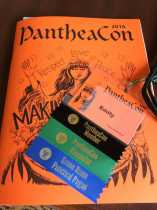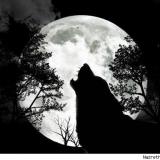
This year I once again had the great pleasure of presenting pop culture magick at Pantheacon. This year was all about the importance of doing pop culture magick and how to strengthen your practices. An amazing group of familiar faces and new friends attended and reminded me just how awesome you all are. I always learn so much from workshop attendees - big hugs to you all. For those who weren’t able to attend, or who attended and want some notes, here is a summary of the major points.
Pop culture magick is important work
We are constantly bombarded by media just by virtue of existing in the modern world. Everything from billboards, advertising, supermarket merchandising, to pop music comes into our brains whether we want it to or not. All of these things create pathways and links in our minds with the aim of making certain thought patterns more natural. When we learn to do magick we are deliberately doing just that - forging new pathways in our brains in order to make certain actions (e.g. spellwork) easier and more natural. Why not take advantage of the trenches that have already been dug? Pop culture magick is one of the most energetically efficient types of magick out there.
Similarly, mainstream pop culture phenomenons (think Star Wars, Harry Potter, giant pop stars) create massive amounts of energy that can be harnessed by those in the know. Anyone who’s ever been to a sold out concert or a heavily anticipated blockbuster movie knows that they create massive energetic outpourings, far more than could possibly be used in the normal course of events. Anyone who’s ever watched a group of toddlers running around has heard and probably said the following, “...if I could just bottle that energy…” By doing magick with huge pop culture phenomenons you’re doing essentially that - harnessing and using the energy that’s hitting you like a tidal wave any time you walk past a movie theater or, gods forbid, go to the mall.
Further, by using those externally forged channels in our brains for our own purposes we take control of them. Pop culture magick can essentially overwrite the messages implanted in our heads by advertising by deliberately altering their effect. I’d bet good money that everyone reading this article can sing at least half a dozen advertising jingles right now. Take one of those tunes and sing a little incantation to it and suddenly instead of wanting a cheeseburger every time you hear the stupid Red Robin jingle you empower your spell - better for your magick and your budget. Pop culture magick empowers the practitioner to take control of the subtle mental effects of media exposure.
Levelling up your practice
There are as many ways to practice pop culture magick as there are individual practitioners times the number of fandoms they work in. Ultimately every practitioner needs to find the practices that work best for them, but there are two techniques that I feel have tremendous potential and are generally underrated: cosplay and fanfiction.
Cosplay is the modern equivalent of ritual aspecting. Think about it. Cosplayers spend huge amounts of time, energy, and often money in order to really become the characters they’re playing. It’s not uncommon for serious cosplayers to spend months creating costumes, props, and working out to more perfectly resemble their characters - just as much, if not more, than a practitioner would before attempting to draw down or embody a deity. A good cosplayer quite literally becomes their character so long as they’re in the costume. Done with magickal intent this can be incredibly potent. I’ve had the great pleasure of meeting a woman who is a strong advocate for equal representation in comics and does so in full batgirl cosplay. She told me that she would never have had the courage to speak out of fight for what she believes in without the extra strength she feels from wearing the costume. I’m a little shy for full cosplay, but subtle costuming (a t-shirt here, a bracelet there) can have the same effect when used with magickal intent. Get creative and do what you’re comfortable with.
...and then there’s fanfiction, the odd cousin that people in the fandom don’t talk about to outsiders. I like to think of fanfiction as an advanced bardic manifestation technique. If you want to do a spell where Tony Stark helps you pass your computer science exam or Spiderman helps you stand up to a bullying co-worker why not write it all out as a story? Stories told in any form (written, drawn, sung, spoken aloud, etc.) have tremendous power. Bards of old certainly knew this and bards of today are figuring it out pretty quick (think modern “news” narratives and their power in our society). Use whatever medium works for you and create the story you want to see play out, infuse it with your true intent, and let the energy of the story itself move your magick into the mundane. Now I can’t write fiction to save my life but even I can think up a story and let it play out in my head (after years of practicing witchcraft I can visualize like a boss), so you can too. Mary Sue your way to better magick.
Let your fandom be your guide
Once you’ve been doing pop culture magick for a little while you’ll likely find yourself settling into one or two particular fandoms for the majority of your workings. When/if that happens, or if you just want to deepen your connection to a particular fandom, I suggestion looking to the fandom itself to determine how you focus your workings. If you’re in the Supernatural or Buffy fandoms it’s probably a good idea to look into defensive magick and working with the paranormal (even if you’re not particularly interested in it) because it’s so intrinsic to the fandom itself. If you like the X-Men you might look into activism magick; if you like Star Trek think about diplomacy and communication magicks. Let the intrinsic energies of your fandom direct the focus of the next phase of your magickal development, after all there’s a reason you like the fandoms you do.
Beyond that it’s just a matter of inspiration and creativity. Take a closer look at your favorite aspects of your fandoms. What is it about them that makes them so special to you? What does your fandom have to teach you and how can you incorporate it into your practice? Take some time and journal about it in order to really organize your thoughts. This is a great trick for helping you deal with problematic fandoms. For example, I’m a huge fan of the Hannibal series but since pretty much everything about it is more than mildly psychotic it can be tricky to work with magickally. After much contemplation about what I liked I was able to figure out how to do safe and sane magick in that fandom. I figured out I could work with that particular portrayal of Hannibal Lecter (version control people - version control!) as a model for mindful consumption. (Yes, I’m weird and a little depraved; I’ve come to embrace it at this point.) Examine your relationship to your fandom and let that inform your practices.
More than any other practice, in my experience at least, there’s no right or wrong way to do pop culture magick. It’s all about what resonates with you, what feels the most natural, what feels empowering, and what gets the results you want. Pop culture magick is getting a lot of attention these days, which means it’s also getting a lot of flack from traditionalists who call it lazy magick. I say if you don’t like it, don’t do it. I just want to share what works for me because I think other people might find it helpful. No one form of magick is right for everyone. Give it a try and if you don’t like it don’t continue doing it, but if you do like it then come and talk to me :)

 I enjoy superhero movies. I enjoyed the recent Batman vs. Superman movie and I'm looking forward to X-men Apocalypse and Captain
I enjoy superhero movies. I enjoyed the recent Batman vs. Superman movie and I'm looking forward to X-men Apocalypse and Captain Interesting perspective. Certainly one wonders what would happen if we had such people in our world.
Interesting perspective. Certainly one wonders what would happen if we had such people in our world.



















